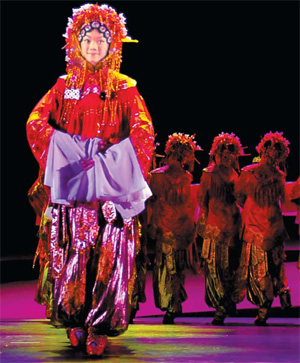The bound feet of director Zhang Jigang's mother was the inspiration for his latest musical creation, Liberation.
Zhang, who was one of the creators of the Beijing Olympic Games Opening Ceremony, tells the heart-wrenching story of a young woman who bound her feet and why society needed to change.
But Zhang's most powerful influence was drawn close from home.
 |
|
Dancers with "bound feet" performing in director Zhang Jigang's new musical Liberation. [File photo] |
"My inspiration for the binding-feet dance comes from my mother," he says.
"My 93-year-old mother is a normal kind and working-hard Chinese woman. She is optimistic, open-minded, enjoys life, good at singing and paper-cutting. She never talked to me about her bound-feet but I did watch her walking."
Chinese women began binding their feet from the Southern Tang Dynasty (AD 937-975) and continued the practice for the next 1000 years.
Millions of women broke the arches of their feet and bound four toes underneath the sole of the foot with bandages, to create a "three-inch golden lotus". It was an agonizing ideal of physical perfection.
Bound feet were a status symbol and the only way for a woman to marry into a "good" family.
Set in Shanxi province in the 1940s, the last years of the foot bounding practice, Liberation follows the life of Xiao Xiao who falls in love with her childhood sweetheart Liang Liang. To earn a good future, Liang Liang leaves his homeland to learn business.
One night, Xiao Xiao dreams that her beloved is seduced by a group of women with "three inch golden lotus" and the worrying girl decides to bind her feet. Years after, when Liang Liang returns with a pair of normal-sized embroidered shoes as a gift, he finds Xiao Xiao's feet are broken.
The musical ends in the celebration of the founding of the People's Republic of China, which bans the practice of foot bounding.
Xiao Xiao symbolizes the tragedy of female subjugation, but luckily, ever since 1949, Chinese women have never had to suffer the torture again.
Zhang was once famous for his choreography of The Thousand Handed Goddess of Mercy in which a line of dancers perform various delicate gestures with their arms and hands.
This time in Liberation, he gives full play to his imagination on the female dancers' feet.
In Act 1, some 80 girls dance with bare feet to show the nature, innocence and freedom of the young girls before they have their feet bound.
In Xiao Xiao's dream scene, 24 "feet-binding" women dance in a special way to display the charm of the "three-inch golden lotus".
There is also a scene to portray "liang jiao hui", a custom where women with bound-feet gather together to show off their "golden lotus".
Like in today's beauty pageant, young girls who had recently bound their feet show the "fruit" proudly while the old women walk in a careful, cautious and unsteady manner and make comment.
The "bound feet" dance first appeared in Zhang's vocabulary in 1993 when he created a solo for dancer Li Yulan, who depicted many famous Chinese women, such as the concubine Yang Yuhuan and the White-haired girl.
In his 2004 production A Hand of Wide Jujube, he choreographed a group dance for the "feet-binding" women.
"I also saw my mother help my grandmother who was also bound her feet and this inspired me to create the scene where grandmother persuades Xiao Xiao not to bind her feet," Zhang says.
He says foot-binding is an extreme example of how women had to suffer to satisfy men's tastes.
"What's more, foot-binding limited women's mobility and therefore her ability to take part in politics, social life, and the world at large," he says.
"Bound feet rendered women dependent on their families, particularly their men, and therefore became an alluring symbol of chastity and male ownership, since a woman was largely restricted to her home and could not venture far without an escort or the help of watchful servants.
"I wanted to use Xiao Xiao's tragedy to tell that New China's ban of foot-binding has freed women physically and mentally. It's a liberation."
The musical Liberation is running at the Great Hall of the People till Monday.
(China Daily September 4, 2009)